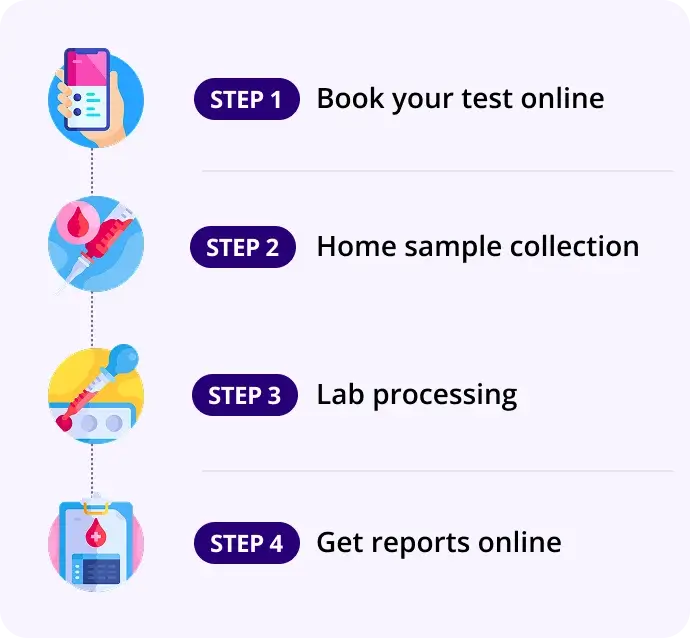Search for
Creatinine Phospho Kinase (CPK) - Total
Heart
Report in 4Hrs
At Home
No Fasting Required
Details
Creatine Phosphokinase (CPK) is an enzyme found in muscle tissue and the brain. There are three isoenzymes: CK-MM/Skeletal Muscle; CK-MB/Heart Muscle and CK-BB/Brain tissue
₹199₹385
48% OFF
FREE:
Ai Insights
Creatinine Phosphokinase (CPK) - Total Test Information Guide
- Why is it done?
- Test Purpose: The CPK-Total test measures the total amount of creatine phosphokinase enzyme in the blood. This enzyme is found primarily in skeletal muscle, cardiac muscle, and brain tissue. It is released into the bloodstream when these tissues are damaged or stressed.
- Primary Indications: Suspected myocardial infarction (heart attack) or acute coronary syndrome; Evaluation of chest pain or acute heart symptoms; Assessment of muscle disorders, weakness, or pain; Investigation of rhabdomyolysis (muscle breakdown); Evaluation of statin-related muscle symptoms; Monitoring patients at risk for muscle damage; Assessment of neurological conditions involving muscle damage; Post-surgical muscle damage evaluation; Monitoring of muscular dystrophy or other muscle diseases.
- Typical Timing: Ordered immediately in emergency settings when acute myocardial infarction is suspected (should be drawn within 6-12 hours of symptom onset for optimal detection); Performed when patients present with acute muscle pain, weakness, or injury; Used in serial measurements to track disease progression or treatment response; May be ordered as part of routine evaluation in patients with unexplained symptoms or known muscle disorders.
- Normal Range
- Reference Range Values: Adults (general): 30-200 IU/L (international units per liter); Males: 39-308 IU/L; Females: 26-192 IU/L; Note: Reference ranges vary by laboratory and testing method. Always refer to the specific laboratory's reference range provided with test results.
- Units of Measurement: IU/L (International Units per Liter); μkat/L (microkatal per liter) - used in some international laboratories.
- Result Interpretation: Normal Result: CPK levels within laboratory reference range indicate no significant muscle damage or disease. Healthy individuals typically have low CPK levels.
- Elevated (High) Results: Slightly elevated (1-2x upper limit): May indicate mild muscle stress, recent exercise, minor muscle injury, or early stage of disease; Moderately elevated (2-10x upper limit): Suggests significant muscle damage, possible heart attack, or active muscle disease; Markedly elevated (>10x upper limit): Indicates severe muscle breakdown (rhabdomyolysis), acute myocardial infarction, severe crush injury, or serious muscle disorder.
- What Normal vs Abnormal Means: Normal CPK indicates that skeletal muscle, cardiac muscle, and brain tissue are functioning normally without significant damage. Abnormal elevation indicates tissue damage or cellular breakdown in one or more of these organs and requires further investigation to determine the cause and location of damage.
- Interpretation
- Detailed Result Interpretation: CPK-Total measures overall enzyme activity but does not identify the source of damage. Clinical context and additional testing (CPK-MB, CPK-BB isoenzymes) are necessary to determine whether damage originates from cardiac muscle, skeletal muscle, or brain tissue.
- Clinical Significance of Elevated Results: Acute Myocardial Infarction: CPK typically rises 6-12 hours after MI, peaks at 24-48 hours, and returns to normal by 3-7 days; Skeletal Muscle Injury: Rises with crush injuries, muscle trauma, intense exercise, or prolonged immobilization; Muscle Diseases: Elevated in muscular dystrophy, polymyositis, dermatomyositis, and other myopathies; Rhabdomyolysis: Extremely high elevations (often >5000 IU/L) indicate severe muscle breakdown; Brain Injury: Elevated after seizures, head trauma, stroke, or intracranial hemorrhage; Hypothermia: Significantly elevated due to muscle damage from severe cold exposure.
- Factors Affecting Results: Strenuous Exercise: Can elevate CPK for 24-48 hours post-activity; Muscle Injections: IM injections cause temporary elevations; Medications: Statins, fibrates, corticosteroids, and certain antibiotics can elevate CPK; Recent Surgery: Elevations expected post-operatively due to surgical trauma; Age and Sex: Males typically have slightly higher baseline CPK than females; Body Composition: More muscular individuals may have higher baseline CPK; Race/Ethnicity: Some studies suggest racial variations in baseline CPK levels; Recent Trauma or Falls: Can elevate levels significantly; Seizures: Often cause substantial CPK elevation; Medications: ACE inhibitors, antiretrovirals, and immunosuppressants may affect levels.
- Result Patterns and Their Meanings: Single Elevated Value: May represent acute event (MI, injury) or recent muscle stress requiring clinical correlation; Rising CPK (Serial Measurements): Suggests ongoing or worsening muscle damage; Falling CPK: Indicates recovery phase or resolution of acute process; Persistently Elevated CPK: May suggest chronic muscle disease or ongoing damage; CPK Elevation with Myoglobinuria: Highly suggestive of rhabdomyolysis or severe muscle breakdown.
- Associated Organs
- Primary Organs/Systems Involved: Skeletal Muscle: Major source of CPK; largest reservoir of CPK in the body; Cardiac Muscle: Heart tissue; primary concern in acute coronary syndromes; Central Nervous System: Brain tissue; elevated CPK-BB with CNS pathology; Smooth Muscle: Minor contribution; involved in some GI pathologies.
- Conditions Associated with Abnormal Results: Cardiac: Acute myocardial infarction, unstable angina, myocarditis, cardiac surgery, defibrillation, coronary artery disease; Skeletal Muscle: Muscular dystrophy, polymyositis, dermatomyositis, rhabdomyolysis, crush injuries, severe exercise, statins-induced myopathy, muscle strain/tears, compartment syndrome, electrocution injury; Neurological: Seizures, intracranial hemorrhage, head trauma, stroke, status epilepticus, prolonged coma; Endocrine: Hypothyroidism, diabetic ketoacidosis, hyperthermia; Trauma: Severe burns, crush injuries, severe falls, motor vehicle accidents; Medications: Statin adverse effects, corticosteroid-induced myopathy, antiretroviral toxicity; Metabolic: Severe dehydration, sepsis, shock, hypoxia; Environmental: Extreme heat exposure, prolonged hypothermia, electrical injury.
- Diseases This Test Helps Diagnose/Monitor: Acute Coronary Syndrome: Primary tool for early MI detection; Myocardial Infarction: Serial CPK measurements help confirm diagnosis and assess severity; Muscular Dystrophy: Extremely elevated CPK (often 50-200x normal) is characteristic; Polymyositis/Dermatomyositis: CPK elevation correlates with disease activity; Rhabdomyolysis: Markedly elevated CPK is diagnostic marker; Statin-Related Myopathy: CPK elevation helps confirm drug-induced muscle damage; Malignant Hyperthermia: Massive CPK elevation occurs during crisis; Sepsis: CPK elevation indicates muscle involvement; Hypothermia: CPK elevation reflects muscle damage from cold; Seizure Disorders: Helps assess severity of seizure-related muscle damage.
- Potential Complications/Risks of Abnormal Results: Rhabdomyolysis: Risk of acute kidney injury, hyperkalemia, cardiac arrhythmias, metabolic acidosis; Myocardial Infarction: Risk of cardiogenic shock, heart failure, arrhythmias, cardiac rupture, sudden death; Compartment Syndrome: Risk of permanent muscle necrosis and limb loss; Severe Muscle Disease: Risk of progressive disability and respiratory failure; Hyperkalemia: From severe muscle breakdown, can cause life-threatening arrhythmias; Acute Kidney Injury: From myoglobin precipitation in renal tubules; DIC: Possible in severe rhabdomyolysis; Sepsis: Secondary complication in severe muscle necrosis.
- Follow-up Tests
- Additional Tests Based on Results: CPK Isoenzymes (CPK-MB, CPK-BB, CPK-MM): Essential for determining source of elevated CPK; CPK-MB specifically elevated in MI; CPK-BB in brain/smooth muscle damage; CPK-MM in skeletal muscle disease; Troponin I or T: Most specific for myocardial infarction; more sensitive than CPK-MB for MI; Myoglobin: Elevated in rhabdomyolysis and severe muscle damage; indicates risk of acute kidney injury; LDH (Lactate Dehydrogenase) and Isoenzymes: Helps determine if damage is cardiac or hepatic; Aldolase: Elevated in muscle disease, helps confirm myositis; AST (Aspartate Aminotransferase): Can be elevated in muscle disease and rhabdomyolysis; ALT (Alanine Aminotransferase): Helps evaluate for hepatic involvement; Electrolytes (Potassium, Calcium, Phosphate): Critical in rhabdomyolysis; hyperkalemia is life-threatening; BUN and Creatinine: Assess kidney function and acute kidney injury risk; Urinalysis: Detect myoglobinuria (indicates rhabdomyolysis); CK-MM and Skeletal Muscle Specific Markers: Further clarify skeletal muscle involvement.
- Further Investigations: Electrocardiogram (ECG): When MI is suspected; shows characteristic ST-T wave changes; Echocardiography: Assesses cardiac function if MI suspected; evaluates wall motion abnormalities; Coronary Angiography: Confirmatory test for acute MI; identifies coronary artery occlusion; Muscle Biopsy: If chronic muscle disease is suspected; helps diagnose muscular dystrophy, myositis; Muscle MRI: Non-invasive assessment of muscle pathology; identifies muscle necrosis or inflammatory changes; Electromyography (EMG): Assesses muscle electrical activity; helps diagnose myopathy vs neuropathy; EMG with Nerve Conduction Studies: Clarifies nature of neuromuscular disorder; CT or MRI of Brain: If CNS involvement suspected with elevated CPK-BB; Metabolic Screening: If endocrine cause suspected (thyroid function, glucose); Toxicology Screen: If drug-induced myopathy suspected.
- Monitoring Frequency for Ongoing Conditions: Acute Myocardial Infarction: CPK measured every 6-8 hours for first 24-48 hours to establish pattern; Serial measurements help confirm MI diagnosis and assess myocardial damage extent; Rhabdomyolysis: Frequent monitoring (every 2-4 hours initially) to track severity; continued until levels stabilize and trend downward; Statin-Related Myopathy: CPK rechecked 2-4 weeks after statin discontinuation; monitored if alternative statins restarted; Chronic Muscle Disease: Baseline CPK established, then monitored based on clinical changes; frequency depends on disease progression and treatment response; Post-Surgical Patients: CPK monitored for 24-72 hours post-op if significant muscle trauma expected; Patients on Medications Affecting Muscle: Initial baseline established; periodic monitoring if symptoms develop; typically checked annually in asymptomatic patients on known myotoxic drugs.
- Related Complementary Tests: Glycogen Phosphorylase Isoenzyme (GPBB): Elevated in some muscle diseases; Fiber-Type-Specific Markers: Help identify specific muscle pathology; Inflammatory Markers (ESR, CRP): Elevated in myositis and inflammatory muscle disease; Coagulation Studies (PT/INR, PTT): Important in severe rhabdomyolysis due to DIC risk; Phosphate and Calcium Levels: Monitor electrolyte abnormalities in severe muscle disease; Uric Acid: May be elevated in rhabdomyolysis and muscle turnover; Creatinine Ratio: Monitors renal function status in relation to muscle breakdown; Blood Glucose: Important baseline in metabolic causes of elevated CPK.
- Fasting Required?
- Fasting Requirement: No - Fasting is NOT required for CPK-Total testing. The test can be performed on a fed or fasted state without affecting result accuracy.
- Special Preparation Instructions: Rest Before Test: Patient should avoid strenuous exercise or intense physical activity for at least 24 hours prior to testing, as vigorous exercise elevates CPK levels; Avoid Muscle Trauma: Minimize any muscle injuries or intramuscular injections for 24-48 hours before test if possible; Medications: Generally no medications need to be held; however, review with provider if on statins, corticosteroids, or other muscle-affecting medications; Timing Considerations: If possible, draw blood in the morning or consistently at the same time for serial measurements; Hydration: Ensure adequate hydration, especially if rhabdomyolysis is suspected; Positioning: Have patient rest in sitting or supine position for 5-10 minutes before blood draw to reduce muscle tension.
- Medications to Avoid (if possible): Statins (HMG-CoA Reductase Inhibitors): Known to elevate CPK; discontinue 2-4 weeks prior if baseline CPK assessment needed; Fibrates: Can elevate CPK, especially when combined with statins; Corticosteroids: High-dose or prolonged use can elevate CPK; Antiretroviral Medications: Certain ART drugs cause myopathy with CPK elevation; Anesthetics: Succinylcholine can cause CPK elevation, especially with malignant hyperthermia predisposition; Note: Do NOT discontinue medications without physician approval. Discuss medication history with healthcare provider; they will determine if test should be delayed or if medication adjustments are needed.
- Other Patient Preparation: Inform Laboratory: Notify lab of any recent muscle trauma, exercise, or procedures; Alcohol: Avoid excess alcohol consumption 24 hours before test, as it can elevate CPK; Inform Provider of Symptoms: Report recent muscle pain, weakness, chest pain, or other relevant symptoms; Timing for Serial Measurements: If repeat CPK measurements planned, note the time of first draw to maintain consistency; Pregnancy: No special precautions; test is safe in pregnancy; Recent IM Injections: Avoid intramuscular injections for 48 hours prior to test if possible, as IM injections traumatize muscle tissue and cause CPK elevation.
- Blood Collection Specifics: Sample Type: Venous blood (serum or plasma); Tube Type: SST (serum separator tube) or plain serum tube typically used; EDTA plasma acceptable for some assays; Volume: Usually 5-7 mL blood required; Processing: Allow blood to clot for 30 minutes if serum tube used; centrifuge at 1000-2000 g for 10 minutes; Stability: CPK is stable at room temperature for 24 hours; refrigerated samples stable for 48 hours; frozen samples stable for extended periods; Handling: Avoid hemolysis (rupture of red blood cells) as it can falsely elevate results; gentle handling during collection and transport essential.
How our test process works!

